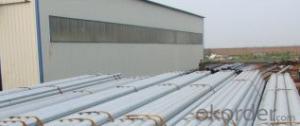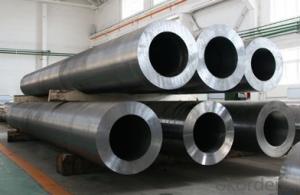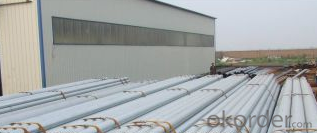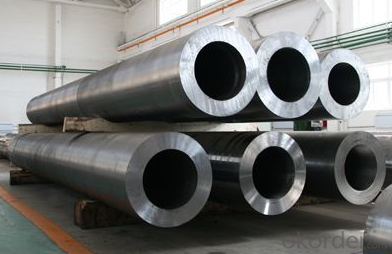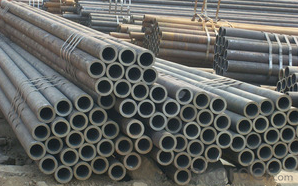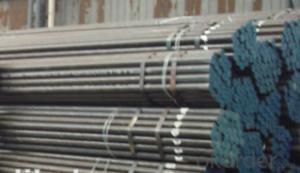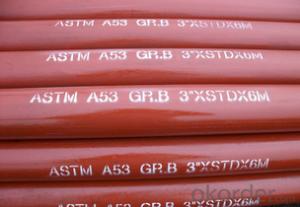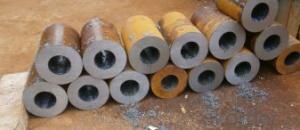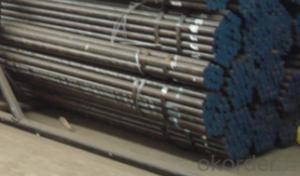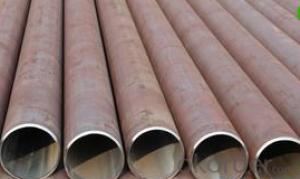Cold Drawn Carbon Steel Seamless Pipe CR-MO ALLOY CNBM
- Loading Port:
- Qingdao
- Payment Terms:
- TT OR LC
- Min Order Qty:
- 10 pc
- Supply Capability:
- 30 pc/month
OKorder Service Pledge
OKorder Financial Service
You Might Also Like
Quick Details
| Thickness: | 1.2 - 20 mm | Section Shape: | Round | Outer Diameter: | 12.7 - 168 mm |
| Secondary Or Not: | Non-secondary | Application: | Boiler Pipe | ||
| Technique: | Cold Drawn | Certification: | PED | Surface Treatment: | oil coating |
| Special Pipe: | Thick Wall Pipe | Alloy Or Not: | Is Alloy | ASTM A213: | T2,T5,T9,T11,T12,T22,T23,T91,T91 |
| ASTM A335: | P1,P2,P5,P9,P11,P12,P22,P23,P91,P92 | DIN17175: | 15Mo3,10CrMo910,12CrMo195,13CrMo44 | Grade: | 12Cr1MoV,Cr5Mo,Cr9Mo,12Cr1MoVG,Cr5MoG,A335 P11,A335 P5,A335 P9,A335 P1,A213,A192,A210,A335 P12,A335 P23,St35.8,Cr-Mo alloy,A53-A369,ST35-ST52 |
| Standard: | BS 3059-2,DIN EN 10216-1-2004,DIN 17175,ASTM A213-2001,ANSI A210-1996,ASTM A179-1990,BS,DIN,ASTM |
Packaging & Delivery
| Packaging Detail: | Seaworthy export packing |
| Delivery Detail: | 45 Days |
Specifications
Standard:ASTM A179,DIN17175
Material:SA179,ST35.8
Size:12*1.2-168*20
Manufacture:cold drawn
Heat treating: normalized
Product Description
Commodity: cold drawn carbon steel seamless pipe
Standard&material: ASTM A213 T2,T5,T9,T11,T12,T22,T23,T91,T92, ASTM A335 P1,P2,P5,P9,P11,P12,P22,P23,P91,P92, DIN17175 15Mo3,10CrMo910,12CrMo195,13CrMo44, and equivalent standard and material.
Size range: 12mm*1.2mm - 168mm*20mm
Manufacture method: cold rolled, cold drawn
Delivery condition: Normalized, Normalized and Tempered.
Mill test certificate as per EN10204 3.1B is available.
Third party inspection is acceptable.
Tubes will be ECT+UT.
Packaging & Shipping
Packing: tubes will be packed in bundles tied with steel strips.
Oil coating,varnish,or black painting to be confirmed.
End plastic caps to be confirmed.
External packing by knit bags.
Marking: to be confirmed.
- Q: What are the different sizes of steel pipe nipples?
- The sizes of steel pipe nipples vary depending on their intended use and application. Common sizes include 1/8", 1/4", 3/8", 1/2", 3/4", 1", 1 1/4", 1 1/2", and 2". However, there are many other sizes available to cater to specific needs and requirements.
- Q: How are steel pipes used in the automotive exhaust system?
- Steel pipes are used in the automotive exhaust system to transport and expel the exhaust gases from the engine. They are durable and resistant to high temperatures, making them suitable for this purpose. Steel pipes are often bent and welded together to form the exhaust system, ensuring a smooth flow of exhaust gases and minimizing any leaks.
- Q: What is the typical diameter range for steel pipes?
- The typical diameter range for steel pipes can vary depending on the specific application and industry requirements. However, in general, steel pipes can have diameters ranging from as small as 0.5 inches (12.7 millimeters) up to several feet (over a meter) in diameter. The most commonly used steel pipes for various purposes, such as plumbing, construction, and transportation of fluids or gases, typically fall within the range of 1/2 inch (13 millimeters) to 36 inches (914 millimeters) in diameter. It is important to note that larger diameter steel pipes are often used for industrial applications, such as oil and gas pipelines, while smaller diameter pipes are commonly used for residential and commercial plumbing systems.
- Q: How are steel pipes used in building foundations?
- Steel pipes are often used in building foundations to provide structural support and stability. They can be driven into the ground to act as piles, which help transfer the weight of the building to the underlying soil or bedrock. Steel pipes can also be used for deep foundation systems such as drilled shafts or caissons, which are used in areas with weak or unstable soil conditions. Additionally, steel pipes can be utilized for underground drainage and utility systems within the foundation structure.
- Q: What are the different types of steel pipe coatings for underground applications?
- The different types of steel pipe coatings for underground applications include fusion bonded epoxy (FBE), polyethylene (PE), polyurethane (PU), and coal tar enamel (CTE).
- Q: How are steel pipes used in data centers?
- Steel pipes are used in data centers for the installation of cooling systems, electrical wiring, and network cabling, providing a robust and reliable infrastructure to support the data center's operations.
- Q: What are the different types of steel pipe fittings for plumbing systems?
- There are several different types of steel pipe fittings for plumbing systems, including elbows, tees, couplings, unions, reducers, and flanges.
- Q: What are the future trends in steel pipe manufacturing?
- Some future trends in steel pipe manufacturing include the adoption of advanced technologies such as automation and robotics, the development of high-performance and sustainable materials, the implementation of efficient and eco-friendly production processes, and the integration of digitalization and data analytics for improved quality control and supply chain management. Additionally, there is a growing focus on the development of specialized pipes for specific industries such as oil and gas, construction, and automotive, as well as an increased emphasis on product customization and tailored solutions to meet the evolving needs of customers.
- Q: How are steel pipes used in the manufacturing of hydraulic systems?
- Steel pipes are commonly used in the manufacturing of hydraulic systems due to their durability, strength, and resistance to high pressures. These pipes are typically used to transport hydraulic fluid, providing a reliable and leak-free connection between various components such as pumps, valves, and actuators. Steel pipes also offer the advantage of being able to withstand harsh operating conditions and ensure efficient fluid flow, making them an essential component in hydraulic system manufacturing.
- Q: How are steel pipes connected to other materials like concrete or plastic?
- Various methods are commonly employed to connect steel pipes to other materials such as concrete or plastic. Among these methods, fittings play a significant role. Fittings, specialized components, serve to facilitate the connection between different materials or sections of pipe. These fittings are available in a variety of shapes and sizes, including elbows, tees, reducers, and couplings, and are designed to establish a dependable and leak-proof connection. When it comes to connecting steel pipes to concrete, one method involves the utilization of concrete anchors. These anchors are embedded within the concrete structure and provide a stable foundation for securing the steel pipe. Clamps or brackets are subsequently employed to attach the pipe to the anchor. In the case of joining steel pipes to plastic materials, the use of transition fittings proves to be effective. These fittings are specifically crafted to connect steel pipes with plastic pipes. They typically feature different connection mechanisms on each end, such as threads or compression fittings, enabling a secure and reliable joint. Welding techniques can also be employed to connect steel pipes to other materials in certain situations. Welding involves melting the ends of the steel and the other material together to create a robust joint. This method is commonly utilized for connecting steel pipes to steel structures or components. In summary, the connection of steel pipes to materials like concrete or plastic necessitates the utilization of specialized fittings, anchors, or welding techniques. These methods guarantee a secure, long-lasting connection capable of withstanding the demands of the given application.
Send your message to us
Cold Drawn Carbon Steel Seamless Pipe CR-MO ALLOY CNBM
- Loading Port:
- Qingdao
- Payment Terms:
- TT OR LC
- Min Order Qty:
- 10 pc
- Supply Capability:
- 30 pc/month
OKorder Service Pledge
OKorder Financial Service
Similar products
Hot products
Hot Searches
Related keywords
